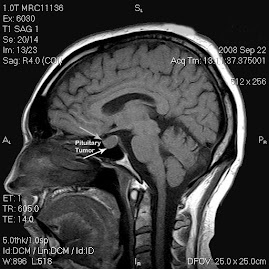I was doing some more research and came across another article. Much of the information is the same as what I have posted in the past but thought it gave a good overview of pituitary tumors.
Pituitary Cancer
Definition
A pituitary tumor is an abnormal growth in the pituitary gland, the part of the brain that regulates the body's balance of hormones.
Alternative Names
Tumor - pituitary
Causes, incidence, and risk factors
The pituitary gland is a pea-sized endocrine gland located at the base of the brain. The pituitary regulates and controls the release of hormones from other endocrine glands, which in turn regulate many body processes. These hormones include:
Adrenocorticotropic hormone (ACTH)
Growth hormone (GH)
Prolactin
Thyroid-stimulating hormone (TSH)
About 75% of pituitary tumors release hormones. When a tumor produces too much of one or more hormones, the following conditions may occur:
Central hypothyroidism (excess thyroid-stimulating hormone)
Cushing syndrome (excess adrenocorticotropic hormone)
Gigantism or acromegaly (excess growth hormone)
Prolactinoma (excess prolactin)
As the tumor grows, hormone-secreting cells of the pituitary may be damaged, causing hypopituitarism.
The causes of pituitary tumors are unknown, although some are a part of a hereditary disorder called multiple endocrine neoplasia I (MEN I).
There are other types of tumors that can be found in the same area of the head as a pituitary tumor:
Craniopharyngiomas
Cysts
Germinomas
Tumors that have spread from cancer in another part of the body (metastatic tumors)
About 15% of tumors in the skull are pituitary tumors. Most pituitary tumors are located in the anterior pituitary lobe and are usually noncancerous (benign).
Pituitary tumors develop in about 20% of people, although many of the tumors do not cause symptoms and the condition is never diagnosed during the person's lifetime.
Symptoms
Symptoms associated with pituitary tumors include:
Changes in weight
Weight gain (unintentional
Weight loss (unintentional
Constipation
Enlarged hands, feet
Facial changes
Enlarged jaw, tongue, bones of the face
Moon face, puffy eyes
Hair changes
Coarse, thin head hair
Loss of body hair
Thinning eyebrows
Headache
Lethargy
Low blood pressure
Nasal drainage
Nausea and vomiting
Personality changes
Decreased sexual interest
Irritability
Problems with the sense of smell
Seizures
Skin changes
Temperature sensitivity
Intolerance to cold
Intolerance to heat
Visual changes
Double vision
Drooping eyelids
Weakness
Symptoms only in women:
Abnormal nipple discharge
Stopping of menstruation
Excessive body hair
Symptoms only in men:
Breast development
Impotence
Signs and tests
Your health care provider will perform a physical examination and will note any problems with double vision and visual field, such as loss of peripheral vision or the ability to see in certain areas.
Endocrine function tests include:
Cortisol levels:
Dexamethasone suppression test
Urine cortisol test
Follicle-stimulating hormone (FSH) levels
Insulin growth factor-1 (IGF-1) levels
Luteinizing hormone (LH) levels
Serum prolactin levels
Testosterone/estradiol levels
Thyroid hormone levels:
Free T4 test
TSH test
Tests that help confirm the diagnosis include the following:
Formal visual field testing
MRI of head
Treatment
Pituitary tumors are usually not cancerous and therefore won't spread to other areas of the body. However, they can cause serious problems by putting pressure on important nerves and blood vessels.
Surgery to remove the tumor is often necessary, especially if the tumor is pressing on the optic nerves, which could cause blindness.
Most of the time, pituitary tumors can be removed through the nose and sinuses. However, some tumors cannot be removed this way and will require removal through the skull (transcranial).
Radiation therapy may be used to shrink the tumor, either in combination with surgery or for people who cannot undergo surgery.
The following medications may shrink certain types of tumors:
Bromocriptine or cabergoline are the first-line therapy for tumors that release prolactin. These drugs decrease prolactin levels and shrink the tumor.
Ocreotide or pegvisomant is sometimes used for tumors that release growth hormone, especially when surgery is unlikely to result in a cure.
Support Groups
The Pituitary Network Association -- www.pituitary.org
Expectations (prognosis)
If the tumor can be surgically removed, the outlook is fair to good, depending upon whether the entire tumor is removed.
Complications
The most serious complication is blindness, which can occur if the optic nerve is seriously damaged.
Permanent hormonal imbalances may be caused by the tumor or its removal. This may require replacement of the affected hormones.
Calling your health care provider
Call your health care provider if you develop any symptoms of a pituitary tumor.
References
Ezzat S, Asa SL, Couldwell WT, et al. The prevalence of pituitary adenomas. Cancer. 2004 Aug 1;101(3):613-9. Review.
Melmed S, Kleinberg D. Anterior Pituitary. In: Kronenberg HM, Melmed S, Polonsky KS, Larsen PR. Kronenberg: Williams Textbook of Endocrinology. 11th ed. Philadelphia, PA: Saunders Elsevier; 2008:chap 8.
Subscribe to:
Post Comments (Atom)


No comments:
Post a Comment